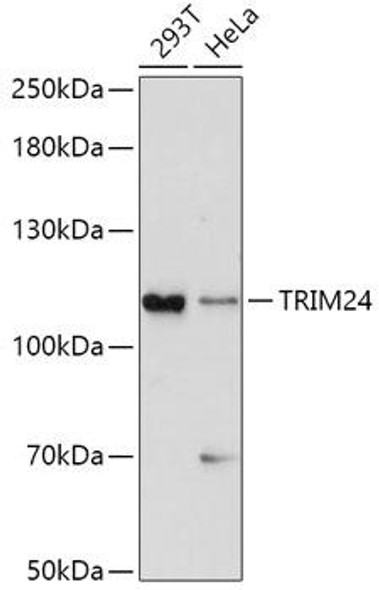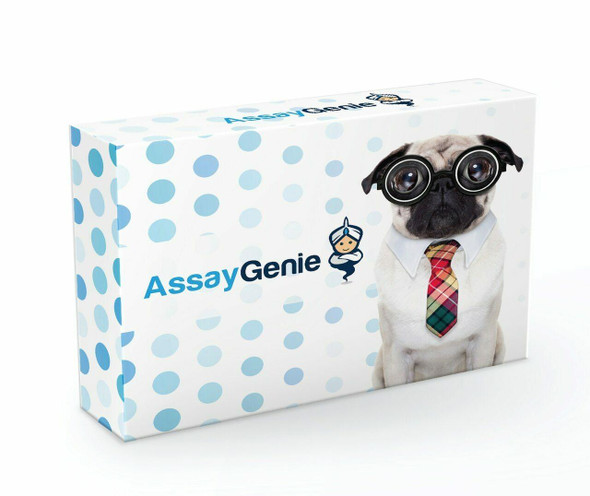| UniProt Protein Function: | TRIM24: an atypical protein kinase that functions as a transcriptional coactivator. Originally identified as a mammalian protein that enhances the AF-2 activity of the retinoid X receptor (RXR) in a yeast genetic screen. Binds to nuclear receptors in an agonist and AF2-activating domain (AF2-AD) dependent manner. Binding to the agonist-nuclear receptor complex induces its own hyperphosphorylation as well as the phosphorylation of TFIIEa, TAFII28, and TAFII55. Belongs to a family of nuclear proteins that includes TIF1b and TIF1g. TIF1 proteins are characterized by an N-terminal region that contains a RING finger-B boxes-coiled coil (RBCC) motif, a poorly conserved central region, a C-terminal region that contains a PHD finger, and a bromodomain. Interacts with the heterochromatin-associated proteins HP1a, MOD1 (HP1b), and MOD2 (HP1g) and with the transcriptional repression domain KRAB, which is present in many Kruppel-type (C2H2) zinc finger proteins. May act as a repressor through the formation of transcriptionally inactive heterochromatin. Two splice variant isoforms have been described. |
| UniProt Protein Details: | Protein type:ATYPICAL group; EC 6.3.2.-; Kinase, protein; Nuclear receptor co-regulator; Protein kinase, atypical; TIF1 family; Transcription, coactivator/corepressor; Tumor suppressor; Ubiquitin conjugating system Chromosomal Location of Human Ortholog: 7q33-q34 Cellular Component: cytosol; nucleoplasm; nucleus Molecular Function:chromatin binding; estrogen response element binding; methylated histone residue binding; p53 binding; protein binding; protein-tyrosine kinase activity; receptor binding; transcription coactivator activity; ubiquitin-protein ligase activity; zinc ion binding Biological Process: protein catabolic process; protein ubiquitination; regulation of apoptosis; regulation of protein stability; transcription from RNA polymerase II promoter Disease: Thyroid Carcinoma, Papillary |
| NCBI Summary: | The protein encoded by this gene mediates transcriptional control by interaction with the activation function 2 (AF2) region of several nuclear receptors, including the estrogen, retinoic acid, and vitamin D3 receptors. The protein localizes to nuclear bodies and is thought to associate with chromatin and heterochromatin-associated factors. The protein is a member of the tripartite motif (TRIM) family. The TRIM motif includes three zinc-binding domains - a RING, a B-box type 1 and a B-box type 2 - and a coiled-coil region. Two alternatively spliced transcript variants encoding different isoforms have been described for this gene. [provided by RefSeq, Jul 2008] |
| UniProt Code: | O15164 |
| NCBI GenInfo Identifier: | 12746552 |
| NCBI Gene ID: | 8805 |
| NCBI Accession: | O15164.3 |
| UniProt Secondary Accession: | O15164,O95854, A4D1R7, A4D1R8, |
| UniProt Related Accession: | O15164 |
| Molecular Weight: | 117kDa |
| NCBI Full Name: | Transcription intermediary factor 1-alpha |
| NCBI Synonym Full Names: | tripartite motif containing 24 |
| NCBI Official Symbol: | TRIM24 |
| NCBI Official Synonym Symbols: | PTC6; TF1A; TIF1; RNF82; TIF1A; hTIF1; TIF1ALPHA |
| NCBI Protein Information: | transcription intermediary factor 1-alpha |
| UniProt Protein Name: | Transcription intermediary factor 1-alpha |
| UniProt Synonym Protein Names: | E3 ubiquitin-protein ligase TRIM24; RING finger protein 82; RING-type E3 ubiquitin transferase TIF1-alphaCurated; Tripartite motif-containing protein 24 |
| Protein Family: | Transcription intermediary factor |
| UniProt Gene Name: | TRIM24 |












